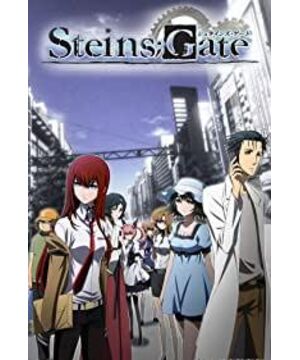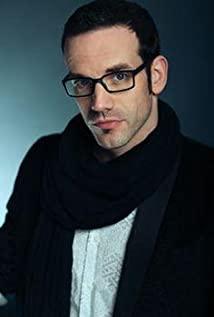Steins;Gate's animated series had several glaring problems:
1. Facialization of supporting roles
This problem is unavoidable for almost all movies, animations and even TV series based on long-form games or novels. There is a huge amount of text in novels and games, except for some dramas in the industry and countries that use love to generate electricity (old version of The Legend of Galactic Heroes, Romance of the Three Kingdoms, etc.), considering the issue of production costs, it is inevitable to focus on the protagonist choice, and supporting roles will inevitably be flattened and masked. Not to mention that the game itself has at least 30 hours of text, in addition to various radio dramas to complete the plot, and finally compressed into 24 episodes of about 8 hours of animation.
On the other hand, the Stone Gate game itself is a Galgame, and it cannot escape the ultimate problem of Galgame:
Hey, do you want an arrogant flat-chested assistant, a big breasts and a gentle green plum, a legal loli senior, a second-class cute maid, a vigorous girl (but the daughter of your buddy), or a pseudo-mother who is more feminine than a woman?
Even though the game's portrayal of each supporting role has been quite three-dimensional, the goodwill of the dead house for different supporting roles comes from the preset Facebook in the final analysis. This may be the congenital defect of Steins;Gate.
2. There are loopholes in the settings
Whether there are loopholes in the settings is a matter of opinion. The discussion on Tieba is actually quite detailed, but it cannot convince everyone. Why?
Because of the discussion on Tieba, I personally think that it is based on some basic settings that have been accepted. And many people's doubts about the setting system are precisely caused by doubts about some basic assumptions, and these basic assumptions are contrary to the scientific theories of the real world. To give a few examples:
World line: parallel universe, relativity, single timeline, causal fatalism;
LHC Mini Black Hole Compressed Memory Data: Information Theory;
World Line Measuring Instrument: Even if I read the discussion, I find it very silly;
Reading Steiner: The biggest bug in this series, unexplained, but also where it all started.
The above are just possible bugs in the game. The animated version is even more unreliable, with a lot of rhythm-defying explanations omitted. So the setting quality of this animation depends on the observer. If you deceive yourself into accepting some unreliable basic settings when watching, then you will find that the three different time travel modes of Stone Gate can actually be rounded back. However, if you still look at it with the concept of real science, the Stone Gate is a castle in the air, and I do not recommend you to watch it.
What's more, if you watch any film and television work, you have to hold a mentality of going to the horns to find loopholes in the settings, which is too unromantic. Too many people try to find loopholes in the settings because the fans of the game say that the settings are rigorous, but they ignore the fun of the work itself, and can only say that they are buying 礟 and returning beads. Many fantasy works are overhead, but this does not hinder their greatness, that is because we know that their worlds come from imagination.
So why is it so harsh on Steins;Gate?
3. Plot and rhythm
In terms of plot, because there is a game plot as a blueprint, it is still good. However, if Line 0 forcibly combines the two large branch lines, a lot of revisions are required. It can only be said that the game design of Line 0 cannot be directly incorporated into the animation.
In terms of rhythm, the protracted and protracted plot in the early stage is also a common problem of Galgame. At that time, I almost smashed the PSP when I played AIR from Key Club... Compared with the Stone Gate, I think Clannd's early days are more interesting. "The rhythm ahead is too slow" and "There are foreshadowings ahead" are not in conflict, they are just observations from different world lines.
In addition, the middle part of the plot was suddenly tense, and then began to be repeatedly brainwashed by "Ahle? Mayuki's pocket watch stopped? It's strange, he just wound up", and then he began to enter the harem in order to eliminate D-mail. Dating drama? This place has to be said to be the result of the facial makeup of the supporting characters in the early stage. The three supporting characters are one for each episode. Personally, I feel that it is really a drama. At least when I finally started to choose one of the two, I was still out of the plot. The last slap that changed the world may be that the foreshadowing was not enough in the early stage (22 episodes are too few), and the change of fierceness is still a bit abrupt.
Even if Steins;Gate has at least so many flaws, I still think it's a masterpiece.
Because this is one of the few works that discusses the ethical issues of time travel for travelers, it is hard to imagine that this connotation actually comes from a Galgame or an animation. When most of the science fiction films about time travel still emphasize walking the "time loop" to tell a story that makes the audience feel brain-burning (so that the audience who thinks that the puzzle has been successfully solved can get IQ pleasure), or through the "time paradox" When discussing the impact of time and space travel on the external world, few works attempt to discuss in detail the psychological impact and ethical challenges brought by these external changes brought about by time and space travel to travelers themselves.
Another work that tries to do this is The Time Traveler's Wife, but Henry can't control his time travel, so he's more like finding a way out of no choice. (Tucao, the scientific setting of the Wife of Time Travel is much worse than that of Stone Gate)
However, Rintaro Okabe can choose whether to travel in time and space (D-mail jumper is also a kind of time travel in essence, which can be understood as the memory coverage between different world lines), so he is responsible for the consequences of each decision he makes. are very clear. Repeatedly experiencing the exact same time is a great test for his psychology and ethics. He will gradually become numb after watching Dudulu's 10,000 ways to die, deliberately not saving Dudulu but by recording the time of death. Trying to figure out the pattern, and also trying to get on the virgin working warrior and ravaging her repeatedly through time travel. This kind of ethical collapse brought about by repeating time travel thousands of times in the same time period, at least before the Stone Gate, I have not seen. Even if this dark ethical collapse is avoided, all kinds of unpredictable dark realities can cause psychological trauma to the time traveler, which should be similar to PTSD. When the traveler thinks there is a perfect outcome, the greater the expectation in the beginning, the worse the fall will be when repeated failures later, especially for Okabe, who is only 18 years old. In addition, Okabe's memory of people and things that once existed in other worldlines, but no one else remembers at all in his current worldlines. The loneliness of being isolated from the world is understood most vividly in the 0 line. These problems that may arise in the traveler's own psychology can be said to be involved in Stone Gate, and there are quite detailed descriptions in the game.
So Steins;Gate can be a love story, but it can also be a story about a person who fights against the world and grows up, and finally has to fight against his negative emotions. Combining personal growth with the negative psychological effects of time travel on individuals, Steins;Gate made a successful attempt, allowing me to look at time travel from another perspective.
View more about Steins;Gate reviews











